2013 October
Kathleen Fitzpatrick, “Open Review, the New Peer, and the Future of Scholarly Communication” – Mon, 11/4, 4:15pm-5:30pm, Room 9206/9207
On 30, Oct 2013 | In Events of Interest | By Laura Kane
Kathleen Fitzpatrick: “Open Review, the New Peer, and the Future of Scholarly Communication”
About The Speaker
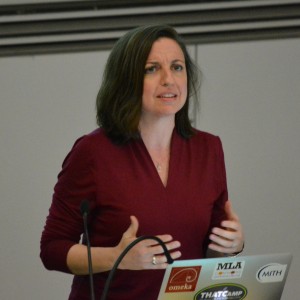 Kathleen Fitzpatrick is Director of Scholarly Communication of the Modern Language Association and Visiting Research Professor of English at NYU. She is author of Planned Obsolescence: Publishing, Technology, and the Future of the Academy (NYU Press, 2011) and of The Anxiety of Obsolescence: The American Novel in the Age of Television (Vanderbilt University Press, 2006). She is co-founder of the digital scholarly network MediaCommons, where she has led a number of experiments in open peer review and other innovations in scholarly publishing.
Kathleen Fitzpatrick is Director of Scholarly Communication of the Modern Language Association and Visiting Research Professor of English at NYU. She is author of Planned Obsolescence: Publishing, Technology, and the Future of the Academy (NYU Press, 2011) and of The Anxiety of Obsolescence: The American Novel in the Age of Television (Vanderbilt University Press, 2006). She is co-founder of the digital scholarly network MediaCommons, where she has led a number of experiments in open peer review and other innovations in scholarly publishing.
Larry Smarr on Digital Culture and the Future Internet: Wed, 10/30
On 28, Oct 2013 | In Uncategorized | By Amanda Licastro
Wednesday, Oct 30th, 2013, 6:00pm, Room C205 at the Graduate Center, CUNY.
This event is co-sponsored by the the DH Praxis Seminar and the Center for the Humanities: http://centerforthehumanities.org/events/Digital-Culture-and-the-Future-Internet.
This event is free and open to the public, registration is not mandatory.
Please reserve you space here: http://cunydhi-smarr.eventbrite.com
Larry Smarr
Professor Larry Smarr is a physicist and leader in scientific computing, supercomputer applications, and Internet infrastructure at the University of California, San Diego. In 2000, Smarr moved to California and proposed the creation of the California Institute for Telecommunications and Information Technology (Calit2), linking departments and researchers at UCSD and UC Irvine. Smarr currently serves as Institute Director of Calit2.
Digital Culture and the Future Internet
Join Larry Smarr, founding Director of the California Institute for Telecommunications and Information Technology (Calit2), as he explores the future of the Internet and digital culture. The Institute develops next generation of information technologies, including optical networks, information visualization, and global telepresence. Under Smarr’s leadership, Calit2 also supports a wide range of innovative projects in digital humanities and in digital art. In these projects, humanists and artists collaborate with scientists to explore potential of new technologies which will not become widely available for another 10-15 years.
To join the digital conversation, use the hash tags: #digitalgc and #cunydhi
William J. Turkel, ” The Hands-On Imperative”- Mon 10/21, 4:15pm-5:30pm, Skylight Room (9100)
On 17, Oct 2013 | In Events of Interest | By Amanda Licastro
Please join CUNY DHI and the Digital Praxis Seminar in welcoming William Turkel for a talk on physical computing and the humanities.
This event will take place Monday, 10/21, from 4:15pm-5:30pm, in the Skylight Room (9100).
This event is free to attend and open to the public. We request you RSVP here, but registration is not mandatory:
http://cunydhi-turkel.eventbrite.com/
William Turkel is engaged in computational history, big history, STS, physical computing, desktop fabrication and electronics. His new monograph, Spark from the Deep, is now available. Turkel is currently working on a study of attempts to build a self-replicating device, from the machine tools of the Industrial Revolution to the RepRaps of today. As part of this research, he has built a series of 3D printers and other CNC tools. The other project Turkel is working on is a study of mid-20th-century analog electronic computing. Turkel teaches Max 6 programming to undergraduates in Western’s new digital humanities option, and to grad students in the interactive exhibit design course. Turkel is also teaching a new graduate course on digital research methods that makes use of command line tools in Linux virtual machines. You can find him on Twitter at @williamjturkel
Matthew G. Kirschenbaum, “Track Changes: The Literary History of Word Processing” – Oct 15, 4:15-5:30pm – Room C204/C205
On 14, Oct 2013 | In Meetings | By Matthew K. Gold
Please join us for a talk by Matthew Kirschenbaum on his forthcoming book project, which was recently profiled in the New York Times: The Muses of Insert, Delete and Execute. Matt’s visit is made possible by the Office of the Provost at the Graduate Center and is being made in connection with the Digital Praxis Seminar.
This event will take place on Tuesday, October 15, 2013 from 4:15-5:30pm at the Graduate Center, CUNY in C204/205 (Concourse Level). Please join us!
—
Track Changes: The Literary History of Word Processing
Mark Twain famously prepared the manuscript for Life on the Mississippi (1883) with his new Remington typewriter, the first literary text ever submitted to a publisher in typewritten form. Today we recognize that the typewriter changed the history and material culture of authorship. But when did writers begin using word processors? Who were the early adopters? How did the technology change their relationship to their craft? Was the computer just a better typewriter—faster, easier to use—or was it something more? And what will be the fate of today’s “manuscripts,” which take the form of electronic files in folders on hard drives, instead of papers in hard copy? This talk, drawn from the speaker’s forthcoming book on the subject, will provide some answers, and also address questions related to the challenges of conducting research at the intersection of literary and technological history.
—
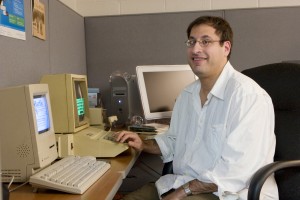 Matthew G. Kirschenbaum is Associate Professor in the Department of English at the University of Maryland and Associate Director of the Maryland Institute for Technology in the Humanities (MITH, an applied thinktank for the digital humanities). He is also an affiliated faculty member with the College of Information Studies at Maryland, and a member of the teaching faculty at the University of Virginia’s Rare Book School. His first book, Mechanisms: New Media and the Forensic Imagination, was published by the MIT Press in 2008 and won the 2009 Richard J. Finneran Award from the Society for Textual Scholarship (STS), the 2009 George A. and Jean S. DeLong Prize from the Society for the History of Authorship, Reading, and Publishing (SHARP), and the 16th annual Prize for a First Book from the Modern Language Association (MLA). In 2010 he co-authored (with Richard Ovenden and Gabriela Redwine) Digital Forensics and Born-Digital Content in Cultural Heritage Collections, a report published by the Council on Library and Information Resources and recognized with a commendation from the Society of American Archivists.Kirschenbaum speaks and writes often on topics in the digital humanities and new media; his work has received coverage in the Atlantic, Slate, New York Times, The Guardian, National Public Radio, Wired, Boing Boing, Slashdot, and the Chronicle of Higher Education. His current book project is entitled Track Changes: A Literary History of Word Processing, and is under contract to Harvard University Press. He is a 2011 Guggenheim Fellow. See http://www.mkirschenbaum.net for more.
Matthew G. Kirschenbaum is Associate Professor in the Department of English at the University of Maryland and Associate Director of the Maryland Institute for Technology in the Humanities (MITH, an applied thinktank for the digital humanities). He is also an affiliated faculty member with the College of Information Studies at Maryland, and a member of the teaching faculty at the University of Virginia’s Rare Book School. His first book, Mechanisms: New Media and the Forensic Imagination, was published by the MIT Press in 2008 and won the 2009 Richard J. Finneran Award from the Society for Textual Scholarship (STS), the 2009 George A. and Jean S. DeLong Prize from the Society for the History of Authorship, Reading, and Publishing (SHARP), and the 16th annual Prize for a First Book from the Modern Language Association (MLA). In 2010 he co-authored (with Richard Ovenden and Gabriela Redwine) Digital Forensics and Born-Digital Content in Cultural Heritage Collections, a report published by the Council on Library and Information Resources and recognized with a commendation from the Society of American Archivists.Kirschenbaum speaks and writes often on topics in the digital humanities and new media; his work has received coverage in the Atlantic, Slate, New York Times, The Guardian, National Public Radio, Wired, Boing Boing, Slashdot, and the Chronicle of Higher Education. His current book project is entitled Track Changes: A Literary History of Word Processing, and is under contract to Harvard University Press. He is a 2011 Guggenheim Fellow. See http://www.mkirschenbaum.net for more.

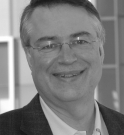
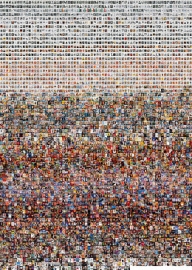
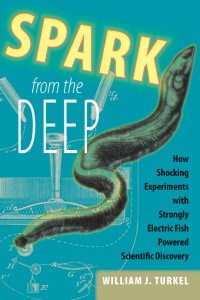
 Welcome to the blog of the CUNY DHI, an effort to build momentum and community around Digital Humanities practitioners at CUNY. We hope you'll join us at our upcoming events and that you'll follow this blog to hear about the latest news in the field.
Welcome to the blog of the CUNY DHI, an effort to build momentum and community around Digital Humanities practitioners at CUNY. We hope you'll join us at our upcoming events and that you'll follow this blog to hear about the latest news in the field.



Recent Comments